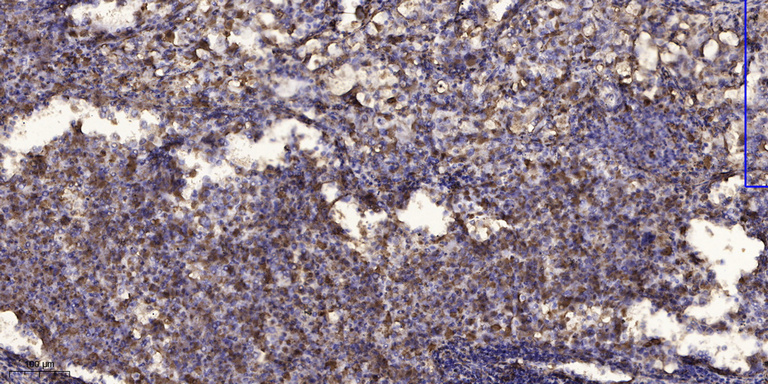Sp1 (Acetyl Lys703) rabbit pAb
- Catalog No.:YK0169
- Applications:WB;IHC
- Reactivity:Human;Mouse;Rat
- Target:
- Sp1
- Fields:
- >>Endocrine resistance;>>Mitophagy - animal;>>TGF-beta signaling pathway;>>Estrogen signaling pathway;>>Cortisol synthesis and secretion;>>Parathyroid hormone synthesis, secretion and action;>>Cushing syndrome;>>Huntington disease;>>Spinocerebellar ataxia;>>Human cytomegalovirus infection;>>Pathways in cancer;>>Transcriptional misregulation in cancer;>>Breast cancer;>>Choline metabolism in cancer;>>Diabetic cardiomyopathy
- Gene Name:
- SP1 TSFP1
- Protein Name:
- Sp1 (Acetyl Lys703)
- Human Gene Id:
- 6667
- Human Swiss Prot No:
- P08047
- Mouse Gene Id:
- 20683
- Mouse Swiss Prot No:
- O89090
- Rat Gene Id:
- 24790
- Rat Swiss Prot No:
- Q01714
- Immunogen:
- Synthesized peptide derived from human Sp1 (Acetyl Lys703)
- Specificity:
- This antibody detects endogenous levels of Human,Mouse,Rat Sp1 (Acetyl Lys703)
- Formulation:
- Liquid in PBS containing 50% glycerol, 0.5% BSA and 0.02% sodium azide.
- Source:
- Polyclonal, Rabbit,IgG
- Dilution:
- WB 1:500-2000;IHC 1:50-300
- Purification:
- The antibody was affinity-purified from rabbit serum by affinity-chromatography using specific immunogen.
- Concentration:
- 1 mg/ml
- Storage Stability:
- -15°C to -25°C/1 year(Do not lower than -25°C)
- Other Name:
- Transcription factor Sp1
- Observed Band(KD):
- 90kD
- Background:
- function:Binds to GC box promoters elements and selectively activates mRNA synthesis from genes that contain functional recognition sites. Can interact with G/C-rich motifs from serotonin receptor promoter.,PTM:O-glycosylated; contains N-acetylglucosamine side chains.,similarity:Belongs to the Sp1 C2H2-type zinc-finger protein family.,similarity:Contains 3 C2H2-type zinc fingers.,subunit:Interacts with ATF7IP, ATF7IP2, POGZ, HCFC1, AATF and PHC2. Interacts with varicella-zoster virus IE62 protein and HIV-1 Vpr. Interacts with SV40 VP2/3 proteins. Interacts with SV40 major capsid protein VP1; this interaction leads to a cooperativity between the two proteins in DNA binding.,
- Function:
- skeletal system development, ossification, eye development, in utero embryonic development, blastocyst development, blastocyst formation, trophectodermal cell differentiation, liver development, placenta development,embryonic placenta development, immune system development, transcription, regulation of transcription, DNA-dependent, regulation of transcription from RNA polymerase II promoter, regulation of transcription from RNA polymerase II promoter, global, sensory organ development, female pregnancy, embryonic development ending in birth or egg hatching, positive regulation of biosynthetic process, positive regulation of macromolecule biosynthetic process, positive regulation of macromolecule metabolic process, positive regulation of gene expression, hemopoiesis,myeloid cell differentiation, erythrocyte differentiation, megakaryocyte differentiation, respiratory tube development,lung
- Subcellular Location:
- Nucleus. Cytoplasm. Nuclear location is governed by glycosylated/phosphorylated states. Insulin promotes nuclear location, while glucagon favors cytoplasmic location.
- Expression:
- Up-regulated in adenocarcinomas of the stomach (at protein level). Isoform 3 is ubiquitously expressed at low levels.
- June 19-2018
- WESTERN IMMUNOBLOTTING PROTOCOL
- June 19-2018
- IMMUNOHISTOCHEMISTRY-PARAFFIN PROTOCOL
- June 19-2018
- IMMUNOFLUORESCENCE PROTOCOL
- September 08-2020
- FLOW-CYTOMEYRT-PROTOCOL
- May 20-2022
- Cell-Based ELISA│解您多样本WB检测之困扰
- July 13-2018
- CELL-BASED-ELISA-PROTOCOL-FOR-ACETYL-PROTEIN
- July 13-2018
- CELL-BASED-ELISA-PROTOCOL-FOR-PHOSPHO-PROTEIN
- July 13-2018
- Antibody-FAQs
- Products Images

- Immunohistochemical analysis of paraffin-embedded human Squamous cell carcinoma of lung. 1, Antibody was diluted at 1:200(4° overnight). 2, Tris-EDTA,pH9.0 was used for antigen retrieval. 3,Secondary antibody was diluted at 1:200(room temperature, 45min).


